When Dongi Kacaw was asked to write three articles about indigenous wild greens 26 years ago, she responded with surprise.
“I don’t know how to do that,” she says. “I just know how to eat them!”
But after returning to Hualien, the indigenous Pangcah (Amis) now known as the “godmother of wild greens” (野菜教母) could not stop thinking about the request. She couldn’t find anything in the library about the plants she grew up with — so she went home to ask her parents.
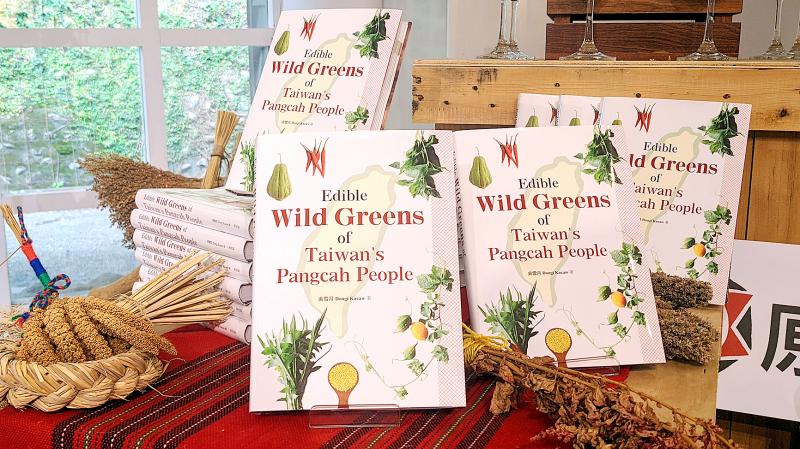
Photo: Han Cheung, Taipei Times
“I started taking photos, visiting sunset markets, going foraging with old people … I completely threw myself into the project like a madwoman,” Dongi says.
She ended up submitting 36 articles to Taiwan Indigenous Voice Bimonthly (山海文化), which became the basis for her 2000 book, Edible Wild Greens of Taiwan’s Pangcah People (台灣新野菜主義). It was unexpectedly popular, and was reprinted 18 times and translated into the Pangcah language last year. On Tuesday, the English-language version of the book was released at the Hualien Indigenous Wild Vegetables Center (花蓮原住民族野菜學校), where Dongi is the principal.
Edible Wild Greens features 63 local entries organized by parts of the plant, as well as six contributions from Hawaii, Indonesia and India that were not included in previous editions.
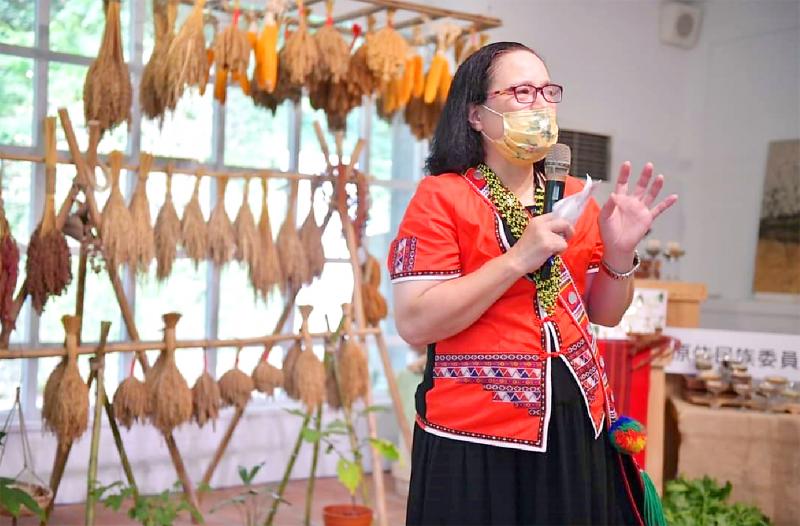
Photo: Han Cheung, Taipei Times
“The purpose of this book is not only to impress on people how many types of edible plants there are in the world, but also to explain, from the perspective of the wild greens culture of the Amis community, the importance of wild plants to our lives,” the book’s introduction states.
Dongi hopes that the book will help facilitate more international exchanges on traditional food culture during events such as the Austronesian Forum and the UN Permanent Forum on Indigenous Issues.
“We share many similar food items with other Austronesian and Southeast Asian peoples, but we may use them differently,” Dongi says. “We can show them how we forage, and then we can exchange and generate new ideas.”
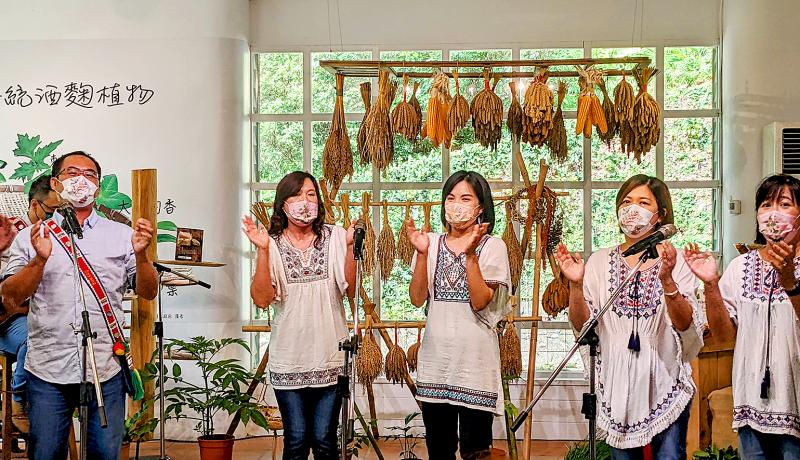
Photo: Han Cheung, Taipei Times
FIELDS AND MOUNTAINS OF EDIBLE GREENS
Despite being best known for her work in studying, promoting and preserving her people’s wild greens, most visitors enthusiastically greet Dongi as jiaoguan (教官, military instructor), referring to the retired lieutenant colonel’s old job at National Hualien University of Education.
“When we Pangcah people look at plants, we always first identify which part is edible,” Dongi says. “We’re the most prolific at eating wild greens in Taiwan. There are fields and mountains full of edible plants here, but most people don’t know about them.”
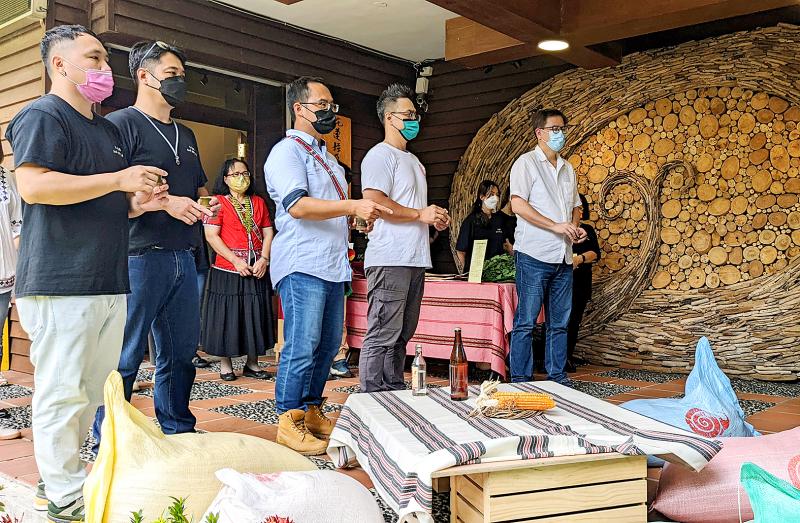
Photo: Han Cheung, Taipei Times
If the Pangcah are unsure about a plant, they’ll pick a tender leaf and lick it with the tip of their tongue.
“If there’s no numbing or tingling feeling, then it’s a wild green,” she says.
Today, Dongi runs a wild vegetable center, which opened in December 2020 with government support. It hosts exhibitions, tours and workshops that promote these plants, with the goal of preserving indigenous biodiversity. Many wild plants she ate as a child have disappeared, and for the past decade she’s been trying to restore them and preserve the seeds.
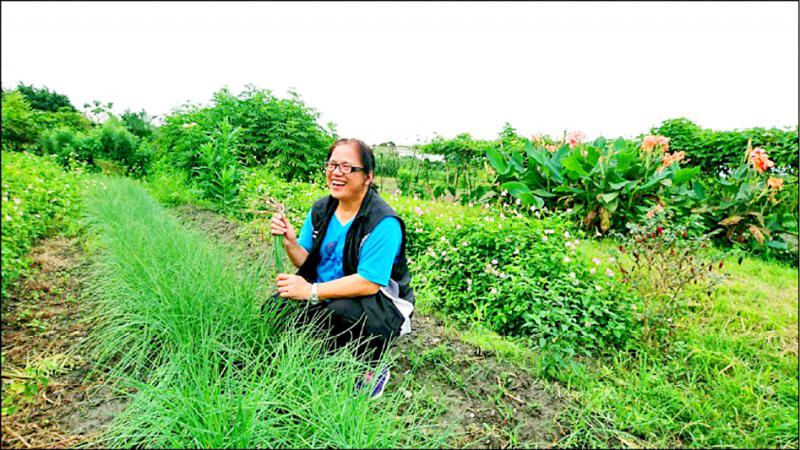
Photo courtesy of Hualien County Government
She’s also led a number of international exchanges as head of the Taiwan indigenous people’s chapter of the Italy-based Slow Food International, which aims to prevent the disappearance of local food cultures and traditions and promote “good, clean and fair” eating. They’ve participated in numerous events abroad, and also host an annual international indigenous slow food forum in Hualien.
As Taiwan’s indigenous people interact more with the rest of the world, especially with their Austronesian relatives and other indigenous groups, it became increasingly crucial to translate Edible Wild Greens of Taiwan’s Pangcah People into English.
TRANSLATOR NOTES
Cheryl Robbins, a licensed tour guide whose work includes the Foreigner’s Travel Guide to Taiwan’s Indigenous Areas series, says she offered to translate the book after seeing Dongi give the Chinese version of the book to several Maori visitors from New Zealand a few years ago.
She credits book editor (and Taipei Times contributor) Steven Crook for alerting her to areas that needed further clarification and elaboration.
“The reader may not have that much experience in indigenous communities,” says Robbins, who has been working with indigenous communities for decades. “[Crook] was good at pointing out when I needed more information and when I needed to simplify and clarify.”
Robbins, whose background is in zoology, was worried that her lack of familiarity with botany would be a challenge, but besides a brief scientific introduction to start each entry, she found the prose quite conversational.
“[Dongi] talks about how her mother and grandmother used [a plant], or that they went to someone’s house and cooked it a certain way,” Robbins says. “It’s tied to her experience growing up in an Amis community, and during that time Taiwan was not very economically well off, so wild greens really did play an important part in their diet.”
Robbins hopes that Dongi continues to produce material in English, and even offer activities and classes in the language.
“She’s a national treasure in terms of her knowledge of wild greens,” she says. “I hope this will be a good first step toward being able to share more of this knowledge not just with indigenous people, but people from various cultures, countries and backgrounds.”
NEW EDITION?
Dongi is already thinking of revising the book, as much has changed for her in the past 22 years. She wanted a more extensive international section in this latest release, but she says she had a hard time finding writers within a short time frame.
“I also didn’t think about the deeper cultural implications when I wrote the stories,” she says.
She’s pondering how to rearrange the book according to the Pangcah knowledge system to “reclaim our food sovereignty,” although she hasn’t entirely figured out how.
“Why do we have to follow the scholarly categorizations of roots, stems, leaves, flowers and fruits?” she asks. “Our people classify some plants according to their taste. We need to quickly sort out and systematize this knowledge.”
Dongi also hopes to include recipes in the book.
There are still some lingering issues with indigenous foodways that Dongi hopes to address. Only in 2019 was the Forestry Act (森林法) amended to allow indigenous people to collect forest resources on public land for personal use without worrying about being arrested.
“We had to covertly harvest yellow rotang palms for their hearts before,” she says. “How can a Pangcah not forage for wild greens?”
She also spoke emotionally about the restrictions on private alcohol brewing.
“This is our culture, our way of life. We have to work hard to change this situation.”

Jacques Poissant’s suffering stopped the day he asked his daughter if it would be “cowardly to ask to be helped to die.” The retired Canadian insurance adviser was 93, and “was wasting away” after a long battle with prostate cancer. “He no longer had any zest for life,” Josee Poissant said. Last year her mother made the same choice at 96 when she realized she would not be getting out of hospital. She died surrounded by her children and their partners listening to the music she loved. “She was at peace. She sang until she went to sleep.” Josee Poissant remembers it as a beautiful

Before the last section of the round-the-island railway was electrified, one old blue train still chugged back and forth between Pingtung County’s Fangliao (枋寮) and Taitung (台東) stations once a day. It was so slow, was so hot (it had no air conditioning) and covered such a short distance, that the low fare still failed to attract many riders. This relic of the past was finally retired when the South Link Line was fully electrified on Dec. 23, 2020. A wave of nostalgia surrounded the termination of the Ordinary Train service, as these train carriages had been in use for decades

Lori Sepich smoked for years and sometimes skipped taking her blood pressure medicine. But she never thought she’d have a heart attack. The possibility “just wasn’t registering with me,” said the 64-year-old from Memphis, Tennessee, who suffered two of them 13 years apart. She’s far from alone. More than 60 million women in the US live with cardiovascular disease, which includes heart disease as well as stroke, heart failure and atrial fibrillation. And despite the myth that heart attacks mostly strike men, women are vulnerable too. Overall in the US, 1 in 5 women dies of cardiovascular disease each year, 37,000 of them

Politically charged thriller One Battle After Another won six prizes, including best picture, at the British Academy Film Awards on Sunday, building momentum ahead of Hollywood’s Academy Awards next month. Blues-steeped vampire epic Sinners and gothic horror story Frankenstein won three awards each, while Shakespearean family tragedy Hamnet won two including best British film. One Battle After Another, Paul Thomas Anderson’s explosive film about a group of revolutionaries in chaotic conflict with the state, won awards for directing, adapted screenplay, cinematography and editing, as well as for Sean Penn’s supporting performance as an obsessed military officer. “This is very overwhelming and wonderful,” Anderson